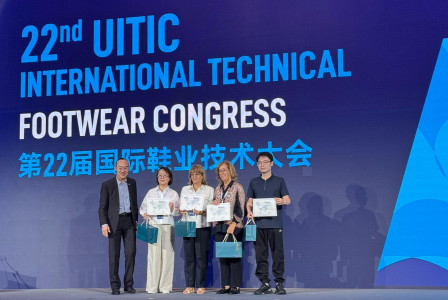News
18 September 2025
From Leather Goods to Footwear: Learning Factories Project Inspires at UITIC 2025
News
18 September 2025
Skills
Textile
Leather and fur
+1 more
Login / create an account to be able to react
-
25

Against the vibrant backdrop of Shanghai, the 22nd UITIC International Technical Footwear Congress brought together the world’s leading footwear experts, innovators, and decision-makers. From 31 August to 3 September 2025, the prestigious event, organised by UITIC and the China Leather Industry Association (CLIA), became a global stage for tackling the industry’s biggest challenges under the theme: “Footwear Competitiveness and Sustainable Development in the Era of AI.”
European Confederation of the Footwear Industry
Topics
Albania
Armenia
Austria
Belgium
Bosnia and Herzegovina
Bulgaria
Croatia
Cyprus
Czechia
Denmark
Estonia
EU-27
Finland
France
Georgia
Germany
Greece
Hungary
Iceland
Ireland
Italy
Kosovo
Latvia
Liechtenstein
Lithuania
Luxembourg
Malta
Moldova
Montenegro
Netherlands
North Macedonia
Norway
Poland
Portugal
Romania
Serbia
Slovakia
Slovenia
Spain
Sweden
Switzerland
Türkiye
Ukraine
Other
Academic / Research and VET Institutions
Business Support Organisation
Company with 250 or more employees
Industry Associations and Chambers of Commerce
National authorities
SMEs (a company with less than 250 employees)
-
Transition Pathway's building blocks
-
-
Skills
-
-
Industrial ecosystems
-
-
Textile
-
-
Textiles ecosystem areas
-
-
Leather and fur
-
Footwear
-
Share
At a time of rapid supply chain reengineering, growing sustainability demands, and accelerating digital transformation, UITIC 2025 offered a unique forum for knowledge exchange and forward-looking solutions. One of the highlights came on 3 September, during the “Successful Industrial Stories” session, when Cristina Vasconcelos, co-owner of Portuguese leather goods company Belcinto (Vasconcelos & Cª), shared how an innovative training model from the leather goods sector is now making waves in footwear.
Her presentation, “Learning Factories: Lessons Learnt from the Leather Goods Sector,” introduced the Erasmus+ Learning Factories project, an initiative led by Belcinto that puts small and medium-sized enterprises (SMEs) at the centre of workforce development. By working hand-in-hand with vocational education providers, SMEs are empowered to design and adapt their own training programmes to match their real-world needs, a people-first approach that aligns perfectly with the congress theme.
Cristina outlined how this model transforms vision into practical tools, including:
- Four open-source agile curricula on digital and green skills with accompanying learning materials
- A training needs scanning tool that provides personalised training paths
An AI assistant delivering real-time tailored resources (videos, guides, presentations) to address workplace challenges
More than a training initiative, the project supports the green and digital transition, strengthens competitiveness, and helps traditional industries attract and retain talent. While rooted in the leather goods sector, it has strong potential to be adapted to footwear, proving its value far beyond its original scope.
As UITIC 2025 showed, the future of competitiveness is not just about adopting new technologies but about empowering people to use them effectively. Belcinto’s Learning Factories project is proof that innovation in training is as vital as innovation in manufacturing, ensuring that skills, creativity, and adaptability remain at the heart of the industry’s sustainable future.
The Learning Factories project is co-funded by the Erasmus+ programme of the European Union.

Comments (0)
See also
EU channels €207 billion towards Digital Decade goals
- Categories
- Infrastructure Investments and funding R&I, techniques and technological solutions +28 more
Introducing the challenge campaign workshops: developing skills in TCLF for the twin transition
- Categories
- Skills Sustainable competitiveness Regulation and public governance +15 more
Have your say: the community engagement survey is now open!
- Categories
- Infrastructure Investments and funding R&I, techniques and technological solutions +28 more




